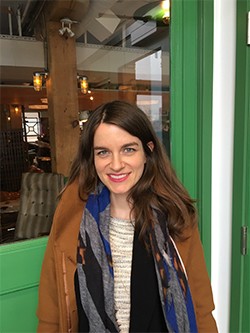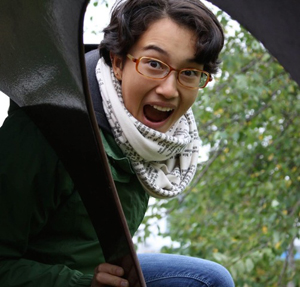The Past Repeating in the Present: Holly Lam in Conversation with Morgan Charles

Morgan Charles, whose creative nonfiction piece "The Medium Lane" appears in the Malahat's Winter 2017 issue, discusses memory, decay, and how time can shift your perspective with Malahat fiction board intern Holly Lam.
Morgan Charles holds a PhD in communication studies from McGill and lives in Toronto with her husband and daughter.
While this is your second publication of creative nonfiction, most of your previous work has appeared in academic journals and books. What do you bring from this background when writing more personal material?
The two kinds of writing are obviously very different, despite both being grounded in nonfiction. When I began writing creative nonfiction, I had to basically unlearn a lot of what I was trained to do in grad school, where dense and somewhat convoluted prose is often unavoidable, and a tone of critical objectivity is usually cultivated over a more personal one. However, I do think that that experience has enriched my writing overall. My academic background has given me an intellectual curiosity and a confidence to pursue obscure connections that I don’t think I would have had otherwise. And despite the obvious difference in perspective and tone, even in my academic work I’ve always been interested in creating a narrative, and my research has similarly centered on themes of memory, decay, and the past repeating in the present.
When reading “The Medium Lane,” its parallels appear seamlessly arranged: the exploration of your anger at a fellow swimmer at the rec centre during your pregnancy, and flashes of interactions with your father. The resonance from the combination is very striking: past and present, the previous generation and the next. Did these elements—the pool scene and those with your father—come together naturally in the writing process? How did you go about structuring them within the piece?
Well first of all, thank you. I’m happy you think it came together seamlessly because that was not the experience of writing it at all! I wrote the pool scene immediately after it happened, when I was still fuming and laughing about it and wanted to get it all down. It wasn’t until maybe a year later, maybe seven months after my daughter was born and my father had passed away, that I went back to read it and realized there was something more I could do with it. Because I was coming at it later, from this different perspective (having lost my father a month before giving birth to my daughter), it was somewhat difficult to try and put myself back in that head space, all that anger and terror, but it helped to have that original pool scene already written in such a raw way to help recapture those feelings. I think I needed that distance of time to look back and see how all those ideas and fears bled together, and why I reacted so strongly to this fast swimmer in the medium lane. At the time, it was all too overwhelming to separate one idea from another. This piece also came together slowly because I was home with an infant, and I could only work on it during her naptime, so it was a very halting process.
The voice has a wryness to it, the humour surfacing through observations and judgments made by you as the narrator. Is this your own sense of humour, or did the narrative voice develop a personality of its own as the memoir took shape?
Yes, that’s my own sense of humour, though I think I definitely sharpened it to my advantage during the writing and editing process. During the time that all of this was happening—my dad’s illness, my pregnancy, etc—I relied on humour a lot to cope with everything. “Gallows humour,” my dad called it. He was a very funny guy and always used humour to deal with his own fears, which is something I definitely inherited from him. He was also my first audience, and I always wanted to make him laugh.
I admire how you deal with emotionally difficult moments, in a manner that’s both matter-of-fact and graceful. The tragic irony of the situation is clear: your daughter is about to be born, while your father is dying. The portrayals of people—yourself and your father—are not one-dimensional, either. You recognize good and bad qualities. How did you navigate writing about your family so intimately? What drew you to do so?
Thank you. I am hopeful that those good qualities come across. Especially for my portrayal of my dad. He was a wonderful, complicated, hilarious, occasionally infuriating (and infuriated) man. Writing about what was happening during his illness felt necessary and cathartic, but I could never have imagined publishing it while it was going on. He was a very private person. Writing about it all after he passed away felt very different, though I was still nervous about painting him in a less favourable light, or upsetting my mother. On the other hand, I didn’t need to worry about upsetting him anymore, so in a way that made the piece possible. During his illness, my father did say to me, “You write whatever you want.” I took those words to heart, as permission and as a directive: he believed in my abilities and wanted me to write. That meant a lot to me and I clung to those words when I felt unsure about whether to pursue this.
The ending left me wanting more, but not needing more, which mirrors your predicament as you leave the pool. There are a number of ways this piece could have concluded: a retrospective reflection, a leap forward in time, a scene with your father. Can you speak to how you decided on the ending?
I decided to keep the story contained to the timeline of the pool outing, mostly for the sake of simplicity. Since I was writing this a year or so later, there was a lot more I could have included, but it didn’t feel true to the spirit of the piece, which was already somewhat complicated chronologically. I think the uncertainty and fear I was feeling at the time is better reflected in a more open-ended conclusion than if I had tied up every loose end.
Do you hope to publish more creative nonfiction, or other genres of writing? Are you working on anything now?
Yes, I do hope to publish more creative nonfiction. I have a few other pieces I’m working on, mostly things I began before my daughter was born and am only getting back to now that I have a bit more time. I also just finished an online short fiction writing course which I found incredibly challenging and humbling, and I’d love to find some time to keep developing those skills as well.

Holly Lam
* * * * * * * *









